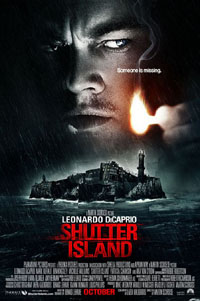 SHUTTER ISLAND
SHUTTER ISLAND(R)
*** (out of 5)
February 19, 2010
STARRING
Leonardo DiCaprio as TEDDY DANIELS
Mark Ruffalo as CHUCK AULE
Ben Kingsley as DR. CRAWLEY
Max von Sydow as DR. NAEHRING
Michelle Williams as DOLORES
Studio: Paramount
Directed by: Martin Scorsese
BY KEVIN CARR
Listen to Kevin’s radio review…
There’s an old saying that it’s better to be smarter than you look than to look smarter than you are. In the same way, it’s better for a movie to have a slow start with an excellent finish than to start off great and have a mediocre finish. Sadly, Martin Scorsese’s “Shutter Island” falls into the latter category.
The film is a psychological thriller about two U.S. Marshals who have been called to a sanitarium for the criminally insane on an isolated island off the coast of Massachusetts to find a missing patient. During the investigation, the lead Marshal (Leonardo DiCaprio) suspects a greater evil is taking place on the island and is determined to uncover the truth.
To say that the second half of “Shutter Island” is a disappointment might be a bit much. However, it doesn’t quite live up to the building tension we see in the first half. I’ve seen a lot of what’s in this film before and even if it were not for the trailers, which give away far too much of the story, I would have guessed practically everything in the movie.
Still, “Shutter Island” isn’t a waste of time. It’s Scorsese’s first narrative feature film since he won the Oscar for his brilliant movie “The Departed” three years ago. While it once again stars DiCaprio as a policeman, it’s not nearly as good. But it’s not entirely bad, either.
The elements of filmmaking are quite good, including a strong performance by DiCaprio as well as Ben Kingsley and Max von Sydow as the doctors in charge of the sanitarium and some smaller yet notable roles by Elias Coteas and Jackie Earl Haley as mental patients and Ted Levine as the warden. The atmosphere that Scorsese builds slowly throughout the piece is rich and powerful, leaning towards the Hitchcock influence without feeling imitative.
All of this is punctuated by an intense and eerie music selection by Robbie Robertson, reminding me of Scorsese’s other fantastic crime suspense film, “Cape Fear.”
With all this said, the movie has some serious flaws, though I cannot entirely blame Scorsese for all of them. The biggest problems lie in the writing, and considering this is adapted from Dennis Lehane’s 2003 novel by screenwriter Laeta Kalogridis, some things may have been lost in the translation. Aside from having an ending that is telegraphed (albeit with a murky signal), there’s an awful lot of padding in the script.
Early in the film, we are treated to drawn-out and gratuitous flashbacks to DiCaprio’s character in World War II. Some of these flashbacks are quite jarring and many overstay their welcome. Similarly, we are all plagued with his overproduced dream sequences that drop some necessary clues but do it in the most awkward way.
I’ve never been a fan of dream sequences in films, unless they are so integral to the plot that the movie could not be done without them (e.g., “A Nightmare on Elm Street”). Otherwise, like unnecessary narration, I find them so often to be cheats from a director trying to show disorientation. I can’t say the dream sequences were not integral to the story, but Scorsese spent too much time in them and needed to tighten the spigot on his creative juices. They just seemed like an expensive student art film at times.
The release of this film made quite a bit of news when it was pulled from October 2 and landed in the February schedule. After seeing the film, I can understand why this was done, considering I doubt this movie would have made any splash in award season. Scorsese is known for bouncing between commercial pictures and artistic expression with his movies, and “Shutter Island” falls somewhere in between, for better or for worse.
Podcast: Play in new window | Download
